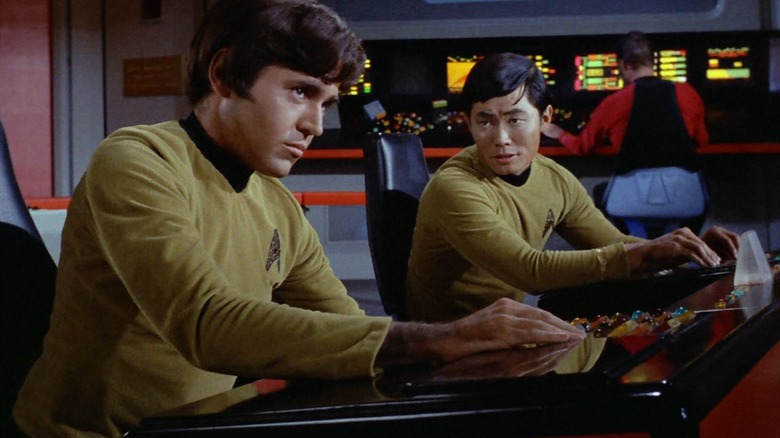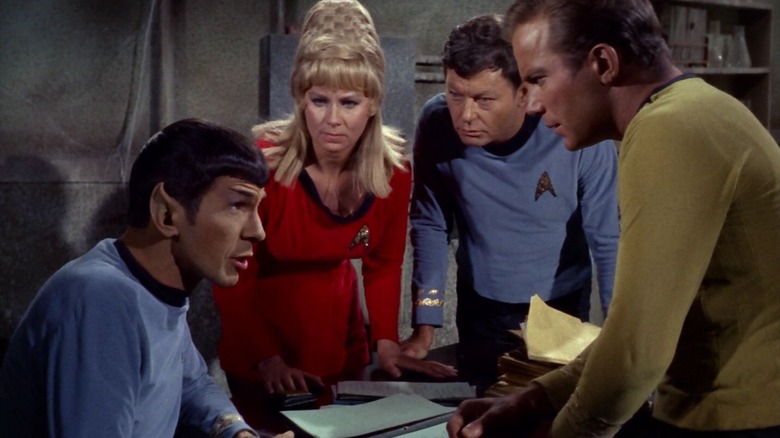Gene Roddenberry’s “Star Trek” could happen in a post-capitalist utopia whereby no character longs for wealth, however right here in our society, its actors can’t reside with that luxurious.
Trekkies will be capable of let you know that “Star Trek” wasn’t an enormous hit when it first aired from 1966 to 1969. It undoubtedly had a small and passionate cluster of followers, and the present was saved from cancelation a minimum of as soon as because of a concerted letter-writing marketing campaign, however it was by no means a top-10 sort of present within the rankings. “Star Trek” would not turn out to be a cultural phenomenon till it started airing in reruns within the mid-Seventies. By then, it was extra broadly accessible, new superfans emerged, and “Star Trek” conventions turned a factor. Gene Roddenberry appeared at these conventions, and he started to relitigate his personal present, with fan encouragement, realizing that he had certainly created a utopian textual content.
The celebs of “Star Trek,” in the meantime, had been in a position to leverage their restricted earnings from the present into conference appearances, as they weren’t getting any cash in residuals. As unfair as it could appear, the unique solid members of the collection — William Shatner, Leonard Nimoy, Nichelle Nichols, DeForest Kelley, George Takei, Walter Keonig, and James Doohan — did not get any royalty funds for these Seventies reruns. Doohan, in a 1979 interview with the Fort Value Star-Telegram (quoted by the Heroes & Icons web site), admitted that neither he nor his co-stars bought a dime from “Star Trek” reruns after the 12 months 1971. In 2020, William Shatner mentioned on Twitter that he receives no royalties for something “Star Trek”-related earlier than 1973.
Those that assume all TV stars had been in a position to reside excessive on the hog based mostly completely on residuals for countless reruns must keep in mind that lots of them had been stiffed out of mentioned residuals due to unfair contracts.
No actors bought a dime in residuals after the early Seventies
Shatner’s above-mentioned Twitter beef noticed him arguing with a bitter fan about his private wealth. Shatner recalled that the late-Sixties weren’t a rosy time for working actors, because the assumed sample of royalty funds hadn’t turn out to be an trade customary. He wrote:
“Something earlier than 1973 (that features ‘Star Trek’ Authentic Sequence) would not pay a cent in royalties. So please do not assume you personal me or I owe you one thing for watching. It would not work like that.”
Shatner additionally talked about his lack of royalty funds on the Transporter Room 3 podcast, hosted by IGN (and reported on by The Hollywood Reporter), clarifying that in these days, no actor on any TV collection bought residuals for reruns after a couple of years. In any case, it was thought of most individuals assumed no TV present would proceed to air in reruns for various years anyway. As such, no studios bothered to put in writing any royalty-based contracts for any actors. Nobody might have predicted that “Star Trek” would strike a decades-long syndication deal that might maintain it on the air for actually many years.
Again within the Fort Value Star Telegram interview, Doohan famous that the unfair funds for the “Star Trek” solid was a motivating consider a widespread contract restructuring all through Hollywood. He mentioned that “Our scenario was what prompted the Display Actors Guild to alter the foundations. […] Now, you receives a commission for all reruns.” That, after solely three years on the air.
On SAG’s personal web site, it’s written that royalties did not exist earlier than 1960. A profitable strike finally put royalties contracts into play, however sadly, retroactive funds weren’t a part of the negotiations, and studios didn’t need to pay royalties to actors in films launched earlier than 1960. Something made in 1960 and past, nonetheless, concerned residual funds.
A short historical past of residuals
It was in 1960 that SAG additionally lastly arrange a pension fund. For the following 14 years, nonetheless, TV stars had been nonetheless getting stiffed. “Reruns” had been nonetheless, it appears, a novel idea, or a minimum of an idea that studios had been prepared to disregard when it got here to paying royalties to their actors. Falling in keeping with Doohan’s and Shatner’s feedback, SAG “collectively negotiated the contract overlaying primetime dramatic programming on the key tv networks for the primary time” in 1974.
In 1980, leisure unions needed to go on strike once more when studios tried to withhold royalties for house video gross sales and for pay TV like cable. Certainly, one may discover that almost all SAG or WGA strikes have been, all through its historical past, concerning the withholding of residuals. The union’s longest strike got here in 1988, and that was largely about how residuals for TV broadcasts in worldwide markets weren’t being paid. In 2007 and 2008, the unions went on strike once more after studios did not pay them residuals for on-line broadcasts. Each new know-how, it appears, is seen as a brand new means by studios to try to stiff SAG members.
This was actually true of the 2023 strikes, which had been about making an attempt to get residuals from the infamous Streaming Wars. Streaming companies, because of a precedent set by Netflix, by no means launched their viewership numbers, and did not really feel any urge to pay royalties to actors consequently. The unions had been in a position to negotiate a cost system, and in addition demanded that studios cease utilizing A.I. tech to scan their faces and use their photos without spending a dime. The 2023 strikes had been the second-longest within the group’s historical past … by in the future.
Fortunately, the “Star Trek: The Subsequent Era” solid benefitted from these earlier strikes, and have been in a position to reside off residuals. Within the case of actor Wil Wheaton, who performed Wesley Crusher, it was all he had for years.

